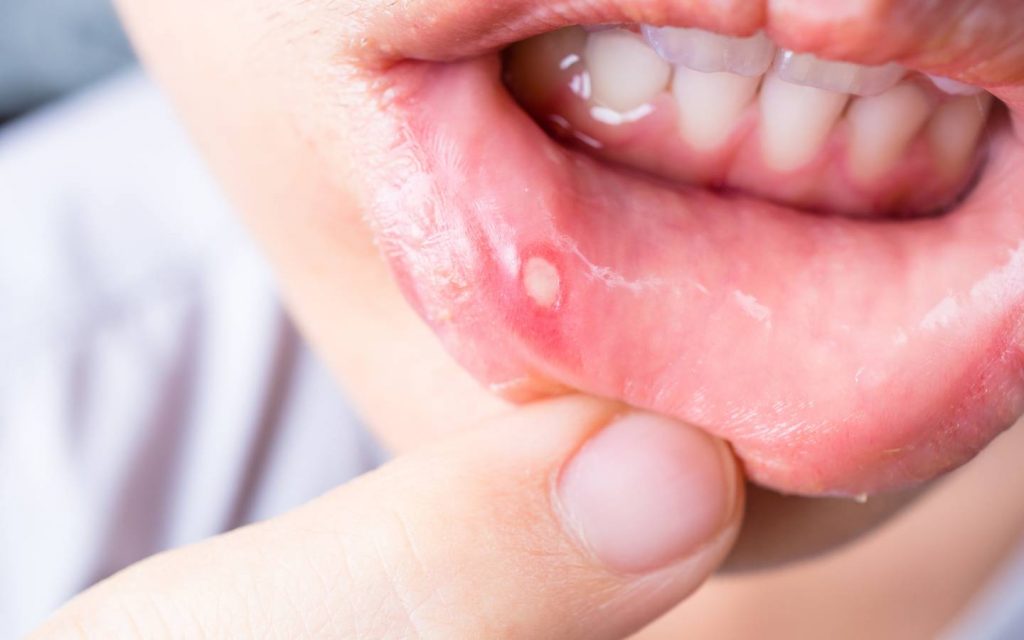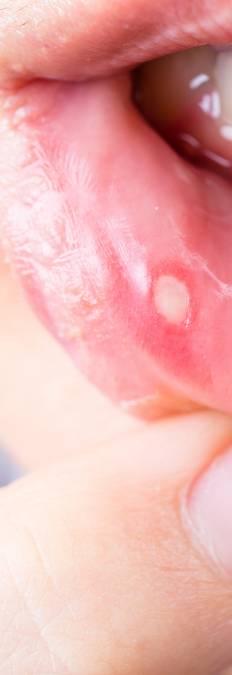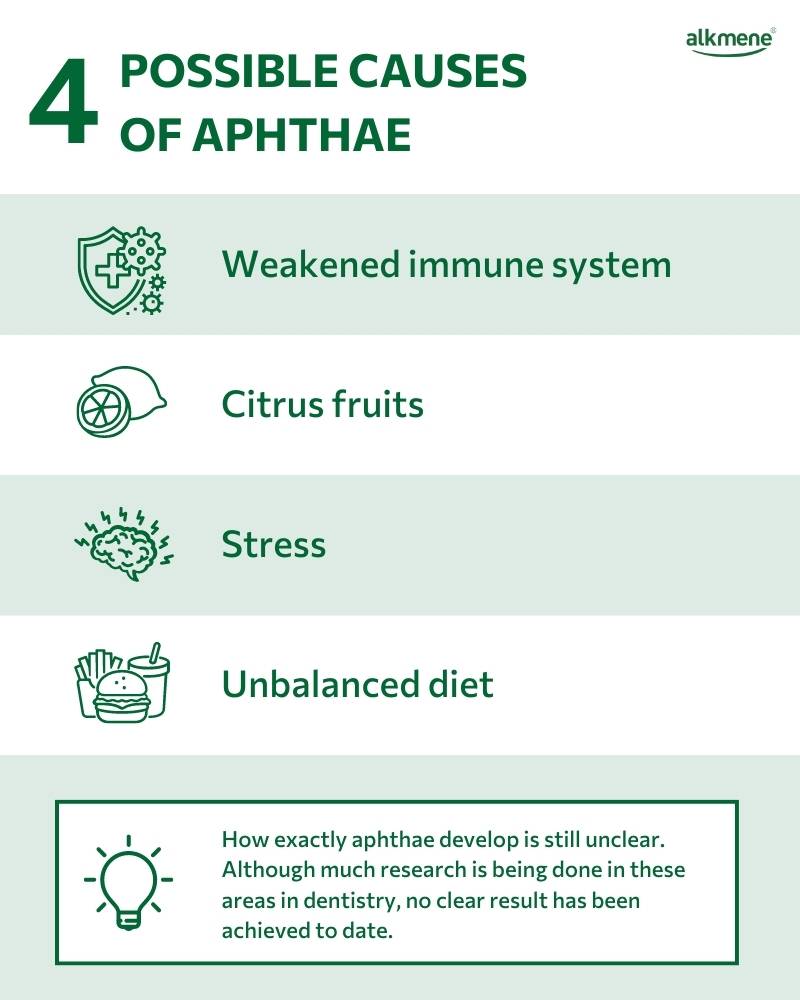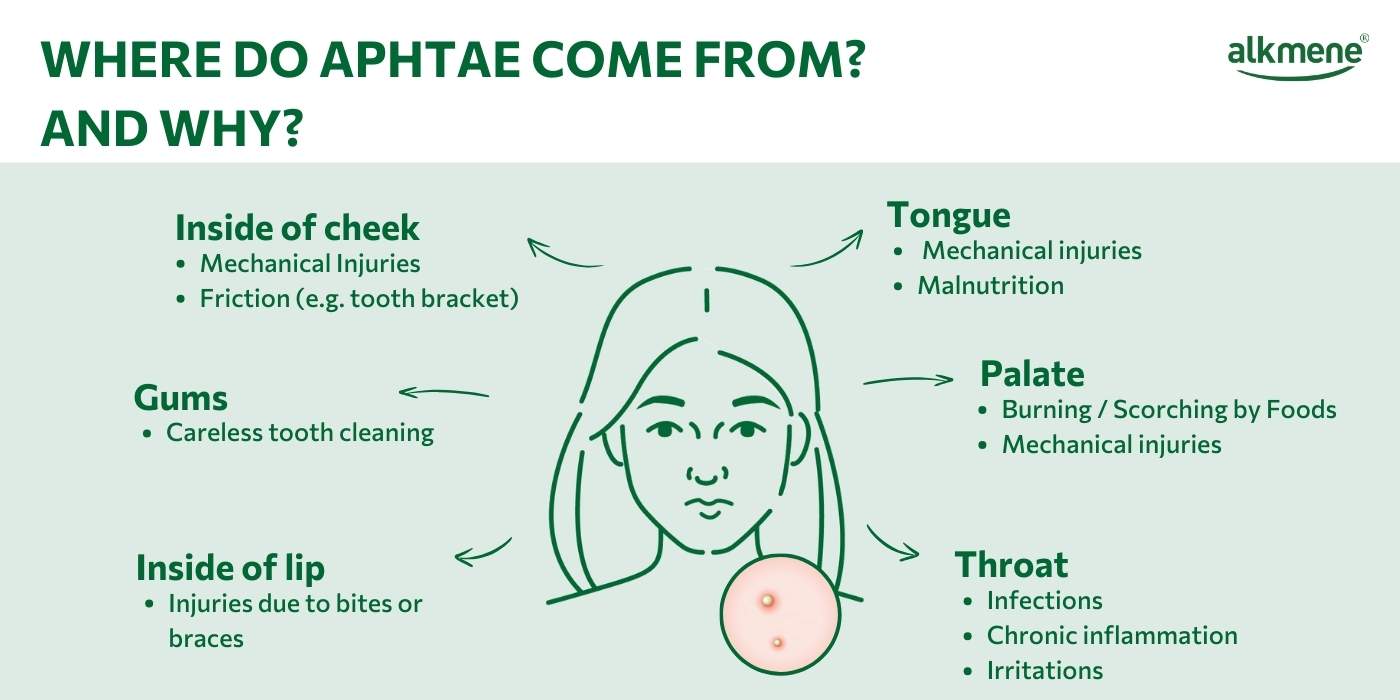


This article has been reviewed by:
Martina Schaale
Dental hygienist
Have you ever had an aphthae? If so, you can probably remember it, because most people find them very annoying, even painful, and therefore not easy to forget. In this article, you will find out how canker sores develop, what causes them, where they occur in the mouth and how you can treat the small white blisters in your mouth.
What are aphthae?
Aphthae are small white blisters in the mouth that affect around 2-10 per cent of people in Germany, making them one of the most common diseases of the oral mucosa. Aphthae appear as whitish, slightly reddish mouth ulcers or sores in the mouth. Sometimes they also first appear as small white blisters in the mouth before they can be identified as actual aphthae.
You can recognise aphthae by the fact that they usually have an oval shape, which appears white to yellowish in the centre and is surrounded by a red inflamed edge on the outside. Aphthae are also often very painful and are particularly annoying when eating, drinking, speaking or brushing your teeth. The white blisters usually disappear again after one to two weeks and heal on their own. Fortunately, they do not leave any scars.

IMPORTANT: Aphthae are like herpes. Anyone who has ever had an aphtha will have to deal with the white blisters in their mouth again and again. And in many different places in the mouth.
Causes: How do aphthae develop?
It is still unclear how the annoying blisters in the mouth develop. Although a lot of research is being carried out in dentistry in these areas, no clear result has yet been achieved. We can only speculate and recognize some connections.

1. Weakened immune system
The development of aphthae is often due to a malfunctioning immune system. If your immune system is weakened, for example due to a viral infection or taking antibiotics, this can lead to increased aphthae formation. The immune system plays a central role in maintaining the health of the oral mucosa. On the one hand, a weakened immune system can lead to infections and inflammation more easily, as viruses and bacteria cannot be combated as effectively. On the other hand, healing and regeneration are also impaired. Wounds in the mouth therefore take longer to heal and increase the likelihood of an additional infection and the formation of aphthae.

INFO: Aphthae are therefore often referred to as an autoimmune disease.
2. Fruit acid as a cause of aphthae
For example, the frequent consumption of citrus fruits can contribute to the formation of aphthae. The fruit acid contained in certain fruits can provoke irritation of the oral mucosa and thus favour the formation of aphthae. These fruits include apples, oranges, strawberries and kiwis. Unwashed fruit can also be an irritant for our sensitive mucous membranes due to germs, bacteria, chemicals or pesticides on the fruit – this can also lead to inflammation and, in the next step, aphthae.
3. Aphthae due to stress
Stress can be another factor in the development of aphthae. Regardless of whether it is professional or personal stress, it always has an impact on our body – including the immune system. This is because stress for us always means stress for our cells. This deprives them of important nutrients that we need for an intact immune system. In addition, stress releases messenger substances that promote inflammation. This places a further burden on our body: so-called oxidative stress!
In a nutshell: Stress weakens our body and our immune system, which is why we become more susceptible to inflammations such as canker sores. So if you frequently suffer from aphthae, stress can play a decisive role. Taking time to relax and consciously regulating stress can be approaches to counteract the formation of aphthae.
4. An unbalanced diet
An unbalanced diet deprives you of important nutrients such as vitamins, minerals and trace elements that are directly involved in the health of our oral mucosa. Vitamin B12, vitamin C, zinc and folic acid, for example, are important for wound healing and regeneration. A deficiency slows down the healing process, which increases the likelihood of small wounds in the mouth becoming infected, inflamed and developing into aphthae. A lack of nutrients and vitamins can therefore be reflected in the mucous membranes.
Very hot, salty or spicy foods can also cause irritation of the oral mucosa. If such meals are eaten frequently and are not well tolerated by the oral mucosa, this can also be an influencing factor in the formation of aphthae.

INFO: Aphthae are not contagious as they are not bacterial or viral in origin.
In which areas of the mouth do aphtae occur?
Aphthae can occur in all areas of the mouth. Depending on the area, there are specific reasons that can contribute to the occurrence of aphthae.

Our product recommendations
Reasons for the occurrence in the various areas
6
What do I need to bear in mind?
Aphthae on the lip or aphthae on the gums are usually perceived as particularly annoying. The aphthae are touched particularly frequently in these areas – when speaking, chewing, drinking or brushing teeth.

INFO: Aphthae rarely occur in the same place in the mouth, but appear repeatedly in other areas.
How can I treat aphthae?
It can take around 10-14 days for the small blisters in the mouth to disappear completely. There is no medicine or ointment that can help treat canker sores – so patience is part of the healing process.
However, some home remedies such as a sage tincture or essential oils such as thymol or tea tree oil can support the healing of canker sores.
Our tip: Tea tree oil as a home remedy for canker sores!
You can add 5-7 drops of our tea tree oil to a glass of water and rinse your mouth with it 2-3 times a day. When using tea tree oil, make sure that it is an oil that can be used in the mouth. You should also never apply undiluted tea tree oil to your oral mucosa, as this can cause irritation, for example. Our all-rounder tea tree oil consists of 100% pure natural tea tree oil in pharmaceutical quality and is known for its antibacterial, anti-inflammatory and antiseptic effect.







